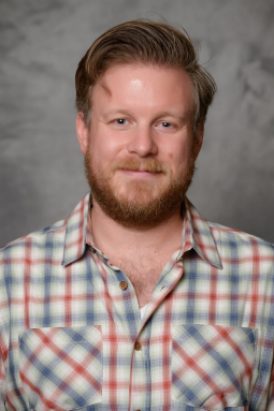FACULTY – Lecturer IV of French, Coordinator for French 101, 102, 103
Spotlight on FRENCH 101: Elementary French & FRENCH 103: Review of Elementary French

How can you integrate climate conversations into first-year language courses? Get creative and talk about it!
After attending the Embedding Climate Change in Courses (EC3) retreat two summers ago, Dr. Ryan Hendrickson began to reflect on his role in the climate movement. He thought, “this sounds very STEM, so where do I fit?” As part of first-year language courses, students frequently discuss topics such as clothing, food, and travel where Dr. Hendrickson noticed that climate-related conversations were naturally emerging during these discussions. Students would often mention things like, “I get my clothes at a vintage shop” or “I want to reduce [my impact].” After participating in the first year of EC3, he realized, “I don’t have to get technical… I really leaned into the impact [of actions], trying to focus more on the human aspect of it all.”
As the Coordinator of first-year French courses, Dr. Hendrickson enjoys exploring cross-disciplinary work and collaborating with colleagues from across the university on gameful pedagogy. This includes adapting courses to incorporate new information—such as articles, books, and media—creating exercises and modules and fostering a sense of community among the lecturers. Over the past two years, the way Dr. Hendrickson integrates climate conversations into his lectures has evolved significantly. Initially, he reserved the last two weeks of the semester to discuss climate topics after covering more traditional language subjects. He found that students were “excited to talk about something that felt weighty, important, and relevant, while also bringing back all of the [topics] we had discussed before.” While he was worried that devoting two weeks at the end of the semester to “doom and gloom” might be overwhelming, he realized that he could instead “focus on the people who are trying to make a difference, the people who are trying to enact changes, finding that hope.”
Now, Dr. Hendrickson incorporates a variety of media—articles, videos, and music—into modules across the course that students with just two semesters of French can understand. These topics range from discussing a community off the coast of Canada that had to consider relocating due to rising sea levels, to deforestation in West Africa and the exploitation of native communities, to sustainability communication strategies in France. This approach also opens the door to conversations about other cultures and their varying levels of awareness regarding environmental actions. For instance, this fall, Dr. Hendrickson plans to introduce a discussion on the Energy Performance Certificate used in France for any property rented, sold, or bought under EU law. This certificate, which rates buildings from A to G, considers factors like heating, hot water, insulation, and cooling and ventilation systems to calculate energy consumption in kWh per square meter per year. This system is also applied to things such as the “healthiness” of foods and how sustainable cars are.
Dr. Hendrickson has students “follow someone on social media who is from a French-speaking area.” Throughout the semester, students closely observe their chosen individual and eventually give small-group presentations on what they observed and learned. Fashion often emerges as a recurring topic in assignments and his courses – with previous students discovering a French website of a fashion designer who focused solely on eco-friendly fashion. Another activity Dr. Hendrickson has introduced involves listening to two French artists with direct connections to climate issues: Les Cowboys Fringants and Climate by Omar Pene. In addition to listening to the music, students analyze the album art, considering what it might signify and how it makes them feel. He says some students “point out the desert colors, the gray, some people see hope, some people see desperation.”
Dr. Hendrickson’s advice for other educators about incorporating sustainability is to “just put yourself in it” and “find those areas where you can connect outside of [your] own field.” He encourages others to introduce climate topics into their courses, noting that “even if it’s the littlest addition to a course, it can have a huge impact.”
For interested students, FRENCH 101 and FRENCH 103 with Dr. Hendrickson are offered every Fall and Winter semester.
As a part of the Year of Sustainability, we are interested in sharing, uplifting, and highlighting stories about the people who make up LSA and have experience teaching about sustainability. We sat down with a series of LSA faculty to discuss their background and courses and will feature these conversations in our Faculty Spotlight series.
To contact the LSA Year of Sustainability Team, please contact [email protected].

